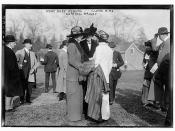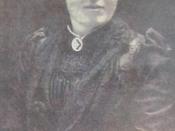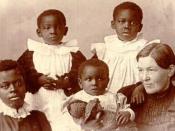Mary Slessor had a determination to love people who had no love.
She wanted to use her experiences of living in the slums to bring the Gospel to they people of Africa. Are you the same way? Do you have a determination to share God's love? While Mary was growing up in the slums of England she witnessed much drunkenness. When Mary was young, her father would get drunk often, and, in a tipsy fit, throw her out of the house. She would then have to face the turmoil of the drunken men outside.
Mary's mother, however, was a Christian and would faithfully bring Mary and her sister to church every Sunday. Mary came to believe in the Christ they talked about in church, and committed her life to him at a young age. Mary also witnessed poverty while she was growing up.
Her mother and father were very poor.
Her father blamed himself for their poverty, which may have contributed to his drunkenness. Many of the people living in the slums of England didn't have a whole lot of anything, many were even lucky to live in a house. Most stayed outside on the dirty streets. Mary promised never to return to her rickety house in England where she grew up once she had left.
Although Mary's experiences living in the slums may have seemed bad, God decided to use them to Mary's advantage. When Mary was thirty-three, she went to visit her pastor and his wife. They were fond of Mary and knew about her desire to be a missionary in Africa. They told her about a missions trip in Nigeria. Within the next couple of weeks, off to Nigeria Mary was headed on a swaying ship. She was not the only thing going to Nigeria though. Mary noticed a myriad of kegs, full of beer. She certainly knew what she was up against. This task came as no suprise to her though. She was used to standing her ground and defending herself against drunks. The kegs did not scare her off.
Mary had a real love and devotion to God. She knew it would be no easy task taking the Gospel to such pagan people that came from such a different culture. She found some of the rituals, such as; hanging the chiefs wife in a slow and brutal process if she had outlived him as company in an "ÃÂafterlife'. However, she obeyed Gods calling to love these people of Nigeria and continued to try to fit into their culture, one that was not so very different from her life in the slums.
Mary was well-respected by the people in the village where she ministered. She spoke out against drinking and many of the women quit the tradition of the parties in which they would get drunk. At one such party, a group of men were beating a woman who had been accused of inviting another man into her hut to eat dinner with her while her husband was away. Mary quickly burst into the scene and stopped the men in their tracks. She stood between the beaten girl and the drunken men and did not budge. The men tried to tease her away, but still, she did not move. The men finally gave up and gave her their full respect. Many in the tribe gave up drinking completely and became Christians that night.
After Mary died of malaria, her body was buried on the banks of the Nigerian coast. It was said that Queen Elizabeth came to the spot where Mary was set to rest, and laid a wreath on her headstone. Mary was loved by many in England as well as in Nigeria. Her mission continued in Africa until the mid-thirties, and then died down. Her love for the people and her willingness to witness to them would never be forgotten.





